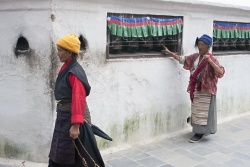Difference between revisions of "Kora (pilgrimage)"
Jump to navigation
Jump to search
| Line 1: | Line 1: | ||
[[File:201.jpg|thumb|250px|]] | [[File:201.jpg|thumb|250px|]] | ||
| − | Kora is both a type of | + | [[Kora]] is both a type of [[Pilgrimage]] and a type of [[Meditation]] in the Tibetan [[Buddhist tradition]]. [[Kora]] is performed by making a walking circumambulation around a temple, [[Stupa]], or other sacred site. Some traditional [[Kora]] important to the Tibetan tradition include circumambulating [[Namtso]] Lake and [[Mt Kailash]], both sacred sites [[In Tibet]]. [[Kora]] is also performed around Swayambhunath and Bodhnath, two important [[Stupas]] in the Kathmandu Valley, [[Nepal]]. |
| − | Kora may be performed while spinning | + | [[Kora]] may be performed while spinning [[Prayer Wheels]], [[Chanting]] [[Mantra]], counting [[Mala]], or repeatedly prostrating oneself. In this [[Way]] [[Kora]] functions as a [[Mind]]-calming [[Meditative]] exercise. In accordance with [[Buddhist tradition]] and belief, [[Kora]] is always performed in a clock-wise [[Direction]]. |
{{W}} | {{W}} | ||
Revision as of 03:21, 24 June 2013
Kora is both a type of Pilgrimage and a type of Meditation in the Tibetan Buddhist tradition. Kora is performed by making a walking circumambulation around a temple, Stupa, or other sacred site. Some traditional Kora important to the Tibetan tradition include circumambulating Namtso Lake and Mt Kailash, both sacred sites In Tibet. Kora is also performed around Swayambhunath and Bodhnath, two important Stupas in the Kathmandu Valley, Nepal.
Kora may be performed while spinning Prayer Wheels, Chanting Mantra, counting Mala, or repeatedly prostrating oneself. In this Way Kora functions as a Mind-calming Meditative exercise. In accordance with Buddhist tradition and belief, Kora is always performed in a clock-wise Direction.
